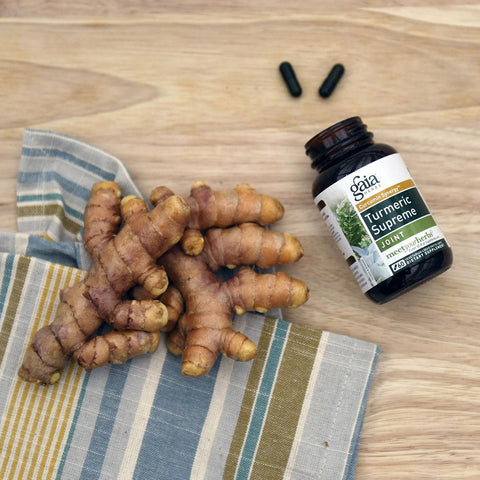One of the best parts about my job here at Gaia Herbs is getting to connect with the people who take our products - or those who want to learn more about herbs. Last summer, we sampled our new TurmericBoost powders at a yoga festival in the beautiful mountains of West Virginia. We met a lot of longtime Gaia Herbs fans, and we also encountered a number of yogis and athletes who were new to herbs.
Turmeric was an herb they'd heard about, but there were a lot of questions. One of the most common questions? Why take a Turmeric supplement if you can just add it to food?
That's a really good question - and the answer requires you to understand the nuances of producing herbal supplements versus adding a "superfood" to your diet. Today, we're sharing the key differences - and many similarities - between Turmeric supplements and whole-food Turmeric. Let's start by looking at why people might take Turmeric in the first place.
Why Turmeric?
When it comes to herbs, Turmeric reigns supreme. It is commonly used to support the body from head to toe.* Turmeric:
- Supports a healthy inflammatory response, both every day and after a workout.*
- Maintains healthy levels of triglycerides (a type of lipid) in the blood.*
- Supports normal bile production in the liver.*
- Naturally stimulates the liver, as a bitter herb.*
- Supports digestion of fats by promoting healthy function of the gallbladder, whose enzymes are essential for breaking down that macronutrient.*
- Supports a healthy response to occasional pain.*
- Supports the production of proteins that naturally regulate immune cells.*
- Helps maintain healthy blood sugar levels already within normal ranges.*
- Supports the body's natural detoxification pathways.*
- Promotes healthy cardiovascular function.*
- Helps support healthy neurological function.*
Cooking with Turmeric
As a food, Turmeric usually comes in a dried powder, though the fresh root is also turning up in many grocery stories in the United States. As a powder, its bright yellow color is easily recognizable. As a whole root (or rhizome, more specifically), it looks a little like its cousin, Ginger, with an orange tint to the thin skin.
Cooking with fresh or dried Turmeric is an easy way to experience the flavor of a delicious, time-tested herb. Adding it in small amounts to food is suitable for daily maintenance, just like eating leafy greens every day is recommended for long-term health. Turmeric has a mild bitter flavor that pairs well with herbs like Black Pepper (more on that when we discuss Turmeric supplements). It's usually an ingredient in curry powder, which is a blend of Indian spices versus a single herb or spice. (Other herbs commonly included are Cumin, Coriander, Cardamom, Cayenne and Mustard, all of which are also used in Ayurveda and herbalism.)
In Indian cuisine, it's used in the aforementioned curry powder, and it adds flavor and color to rice, eggs and more. Beyond Indian dishes, you can add Turmeric to soups, stews and is a main ingredient in the ever-popular drink Golden Milk.
Tip: Use a Microplane or zester to grate fresh Turmeric. You don't need to peel the thin skin, but if you prefer to remove it, use a teaspoon to gently scrape it off without wasting any of the golden root.
Here are nine tasty ways to try cooking with Turmeric:
- Stir into scrambled eggs or tofu. It's quite tasty with Cumin and Cilantro added.
- Add to smoothies, especially those with Ginger or pineapple. (This is my favorite!)
- Stir into savory yogurt sauces. Choose whole milk yogurt to get the fat-soluble parts of Turmeric.
- Sprinkle on organic, non-GMO popcorn with ghee or coconut oil, salt, pepper and nutritional yeast.
- Stir into sauces, marinades and dressings for flavor and color.
- Add thin slivers of Turmeric root to rice or other whole grains before cooking.
- Stir into our Ginger-Miso Dressing.
- Make a compound butter with Turmeric, fresh Cilantro and a bit of garlic.
- Mix with white miso paste for a quick flavor boost for mild fish or tofu.
OK, now it's time for the "but."
Cooking with Turmeric is wonderful, and as a plant-based chef it's a staple in my spice rack. As a food, Turmeric supports your ojas (vital energy), and, being a bitter herb, it supports digestion, too.* But... it doesn't offer the same support that a supplement does. Here's why:
Using Turmeric Supplements

For targeted support, a supplement is the way to go.
To achieve a daily serving - recommended by researchers as up to 3 grams of dried powder or whole root - you would need to consume 1 ½ teaspoons of Turmeric daily. Due to Turmeric's bitter taste, this amount may seem unpalatable to many people.
The fat-soluble active components of Turmeric, including its essential oils, need to pass the blood-brain barrier to offer neurological support as well as support for any of the other targeted areas we mentioned above. However, in culinary uses, these essential oils are not preserved (cooking only releases their aroma and flavor) or not available (most uncooked preparations don't support absorption of those fat-soluble components), and the potency of dried Turmeric diminishes over time.
An extract (such as a Liquid Phyto-Cap) provides a concentrated, potent serving designed for specific, targeted support. In addition to whole root Turmeric, Gaia's Turmeric Supreme line also contains Turmeric extract and black pepper, which allows it to cross through the gut lining and offer support in specific areas in a short amount of time.* When consuming Turmeric as a food, your body will need to do the extraction itself, which requires more effort, in order to obtain the needed constituents that a Turmeric extract provides more easily.
Choosing Turmeric
When choosing Turmeric for cooking, always look for organic options. Check your local farmers market for small purveyors of high-quality Turmeric root; the herb prefers tropical climates but can be grown in greenhouses for culinary use. When buying dried Turmeric, think small: Dried herbs and spices lose their potency over time, so purchase only what you'll use in a few months. Choose sellers with good turnover to avoid buying Turmeric that has lost its flavor and aroma.
As for supplements, there are a few more things to consider. Curcumins are the active constituents that receive the most attention, but they are one of many bioactive parts of this herb. Using the full plant is important, and the interactions between constituents within a plant should not be overlooked. Nature has gifted us with so many plants to support our health and wellbeing, and at Gaia we are committed to preserving what nature has shared with us. Because curcumins are fat-soluble, they are often extracted using toxic solvents, some of which will be present in the final product.
Choose supplements that are concentrated and extracted without the use of these toxic substances. (The Turmeric used in Gaia's products is extracted using alcohol, water and carbon dioxide.) And while you do not want a product that is only isolated curcumins, standardized supplements can offer a guaranteed amount of that active constituent. The Curcumin Synergy line includes both a guaranteed amount of curcumin, which varies by product, as well as whole-plant Turmeric extract, to include the herb's full spectrum of active constituents.
Bottom line: Cook with Turmeric for everyday support and flavor. For targeted support, reach for a supplement that's pure, potent and made with integrity.
Dr. Mary Bove, ND, former Director of Medical Education for Gaia Herbs, reviewed and approved this content.
